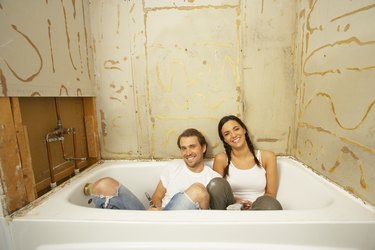
When it comes time to enclose the walls in a bathroom construction or remodeling project, builders are faced with a decision. The moisture that's prevalent in a bathroom creates problems for standard wallboard, but the alternatives have their drawbacks. Making the best choice requires balancing differences in durability, cost and ease of installation.
Gypsum Board
Video of the Day
Standard sheets of drywall are made from a core of gypsum sandwiched between layers of paper. This type of wallboard is the most common material used on walls in home construction. Gypsum board is not the best choice of material for bathroom walls, however. When exposed to moisture, which any wallboard will be in a bathroom, gypsum board swells, molds and deteriorates. Especially if used as a backing for tile in a tub or shower surround, unprotected gypsum board is not durable or stable enough to stand up to the bathroom environment in the long term.
Video of the Day
Cement Board
A popular alternative to gypsum board is cement board. Made from reinforcing fibers held together by a cement binder, cement board is strong, durable and moisture resistant. It is stable and resists the growth of mold and mildew. Unlike gypsum board, it will not swell or break down when it gets wet. The biggest disadvantage of cement board is its weight. It weighs approximately twice as much as gypsum board per square foot, and the heavy sheets are relatively difficult to install.
Composite Board
Modern wallboards made of a combination of materials seek a compromise between the water resistance of cement board and the relative ease of installation of gypsum board. Products such as Georgia-Pacific's DenShield surround a core of reinforced gypsum with layers of fiberglass mat in order to keep moisture from getting to the vulnerable heart of the board. A layer of acrylic polymer on the interior side surface of the board provides additional protection against the infiltration of water. These boards are designed to be used as tile underlayment in wet areas, but they can also be used alone as wallboard.
Tile Membrane
Tile membranes are products that allow ceramic tiles to be installed over standard gypsum wallboard in wet areas. They are sheet products that are applied directly over the drywall, and seams between the sheets are sealed with joint tape and mortar. Tile is then installed directly on top of the membrane. The membranes are water resistant and vapor-tight, allowing them to keep the gypsum board beneath them dry.